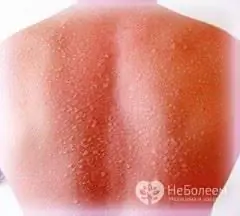- Author Rachel Wainwright [email protected].
- Public 2023-12-15 07:39.
- Last modified 2025-11-02 20:14.
Summer diseases

We habitually believe that our body is most vulnerable to harmful microbes in autumn and winter, and with a cold snap we are preparing to either meet this as inevitability, or still take action and try to avoid it. However, in fact, it is necessary to take measures and take care of health at any time of the year, since in each of them the body is vulnerable to a certain type of disease. Summer is associated with anything - with heat, with rest, with the sea, a summer residence, but least of all with sores. Nevertheless, there are diseases that are specific for the summer, and it is better to know about them in advance, so that by spreading straws, you can really spend this blessed time with pleasure, and not groaning in a hospital bed. To this end, we offer you a small overview of the most common "summer" diseases.
Angina and other colds
Angina is number one on our list, and not only because of the letter "A". Angina occurs ten times more often in summer than at any other time of the year. The fact is that heat weakens the immune system no less than cold, sudden temperature changes are especially dangerous, which do not allow the body to properly adapt to either cold or heat. Therefore, a strongly chilled drink from such a tempting, sweaty bottle can and easily becomes that last straw that leads to inflammation of the pharyngeal lymphatic ring - the entrance gate of infection. But due to hypothermia in the heat, not only sore throat or tonsillitis occurs, but also pharyngitis, bronchitis and a runny nose, yes, such "autumn" diseases are quite frequent, overtaking fans of conditioned air with a temperature drop of more than 7-10 ° C.
Intestinal infections
Summer is a time of rampant intestinal infection. The hot temperature creates favorable, downright incubation conditions for most microorganisms of this type. Heat is especially dangerous in this respect against a background of high humidity. It is known that while on vacation, many people for some reason treat their safety more carelessly than in their usual conditions. Food in a dubious cafe, pies or creepy cream cakes, a bad dream of an infectious disease doctor bought from beach hawkers, perishable food that has lain for an hour or two outside the refrigerator - all this is a direct way to the infectious diseases department of the nearest clinic. To avoid such an unenviable fate, buy food only where they are stored correctly, and you can eat outside the home only in those establishments where food is prepared from quality products and served freshly prepared. This is a rule for all seasons, but it is especially important to adhere to it in summer.
Heatstroke
Most often they say "sunstroke", which implies prolonged exposure to the sun. However, in summer, you don't need to be in direct sunlight to get overheated. The main signs of heatstroke, as the stage progresses, are as follows: shortness of breath, hyperemia (redness) of the skin, a rise in temperature to subfebrile and then febrile values, impaired nervous activity: severe headache, dizziness, collapse, fainting, and sometimes convulsions. Quite often vomiting and / or diarrhea joins these symptoms. To avoid heatstroke, it is necessary to wear loose clothing made of natural fabrics in summer, avoid long-term stay in stuffy rooms, drink enough water, it is advisable to have a bottle of water with you at all times.
Sunburn
Exhausted townspeople who dreamed of summer for the last nine months make the same mistake: they expose their white bodies to the hot sun for too long, forgetting that it not only warms, but also burns. The insidiousness of this situation is that the skin does not immediately react to a sunburn, but with a delay of several hours. A person is blissful, basking in the sun, in the firm confidence that everything is under control, because he does not feel the slightest discomfort, although in fact his skin can be burned already to blisters. Discomfort, and even some discomfort, will certainly follow, but in the late afternoon. Therefore, you need to start taking sunbathing from 20-30 minutes a day, gradually increasing this time. Sunbathing under the evil midday sun is generally not worth it - it's not for nothing that all residents of hot countries in the hottest time of the day have a traditional pastime for siesta,daytime sleep somewhere in the shade.

Herpes
As mentioned, heat weakens the immune system. At this time, any dormant infection can crawl out, and very often such an infection is the herpes virus, since according to some reports, more than 90% of the population is infected with this virus. Increased insolation, or exposure to the sun on the skin is one of the "triggers", a factor that triggers herpes activity in the body. Prevention measures are the same as for heat and sunstroke - avoid prolonged exposure to the sun and, in general, any overheating.
Tick-borne encephalitis
Summer is the time of activity of ticks, the main carriers of the encephalitis virus, and the peak of the heat is the peak of their activity. Encephalitis ticks lie in wait for their victims in the forests of the middle zone, but not only foresters, geologists and lovers of "wild" tourism are at risk, but also ordinary summer residents, in whose garden plots ticks also feel quite comfortable, and pet owners, visiting the street. Usually, sanitary and epidemiological services warn people about the appearance of such a danger and every year they do not hesitate to remind that it is advisable to walk in the thickets in clothes that leave as few open areas of the body as possible, and after such walks, you must carefully examine yourself and each other for the detection of dangerous insects …
Trauma
Unfortunately, summer is the most "fruitful" time for emergency rooms and trauma departments of hospitals. This applies to absolutely all types of injuries - domestic, since many people save their vacation for repairs, sports, as well as everyone else that inevitably accompanies active pastime, which is so characteristic of the summer months. There is a slightly pretentious, but completely fair statement that safety rules are written in blood. Do not neglect them, because not a single person who ended up in the hospital due to his own carelessness did not expect such consequences, each of them hoped that he would carry it, as it may have already carried it many times before.
Another important traumatic factor that needs to be mentioned in the chapter on summer injuries is alcohol. Alcohol is not very healthy under any conditions, but its combination with heat can be deadly. There are several reasons at once: firstly, the heat significantly enhances the effect of alcohol, and a couple of glasses of beer, harmless at other times of the year, can have a completely different effect in summer. Secondly, the combined effect of alcohol and heat has an extremely adverse effect on the activity of the heart and blood vessels. And, thirdly, alcohol dulls attention, reduces the level of criticality, distorts perception. Traumatologists will tell you that, at the most conservative estimate, at least 50% of all injuries, especially summer ones, are due to alcohol abuse.
Found a mistake in the text? Select it and press Ctrl + Enter.






